Anxiety disorder is a neurotic condition, in which a person constantly feels an unreasonable or justified feeling of anxiety. It is important to recognize the symptoms of the disease in time and start treating it.
Record content:
-
1 Views
- 1.1 Generalized (anxious-depressive)
- 1.2 Phobic
- 1.3 Social
- 1.4 Post-traumatic
- 1.5 Panic disorder
- 1.6 Obsessive compulsive disorder
- 1.7 Organic
- 2 Symptoms
- 3 Causes
- 4 Diagnostics
-
5 Treatment methods
- 5.1 Lifestyle change
- 5.2 Drug treatment
-
5.3 Folk methods
- 5.3.1 Soothing herbal baths
- 5.3.2 Herbal infusion
- 5.3.3 St. John's wort decoction
- 5.3.4 Lemongrass tincture
- 5.4 Psychocorrection
- 5.5 Other psychotherapy methods
- 5.6 Yoga
- 6 Possible consequences of complications
- 7 Anxiety Disorder Videos
Views
Anxiety disorder, the symptoms and treatment of which depend on the type of disease, has several types.
Generalized (anxious-depressive)
Generalized anxiety disorder is characterized by frequent (persistent) restlessness without sources of concern or danger. People with this diagnosis are worried about something every day that interferes with their usual activities.
Symptoms of anxiety-depressive disorder are divided into clinical and autonomic. Clinical include a permanent decrease in mood, anxiety, sleep and appetite disorders, a feeling of tension (physical and internal).
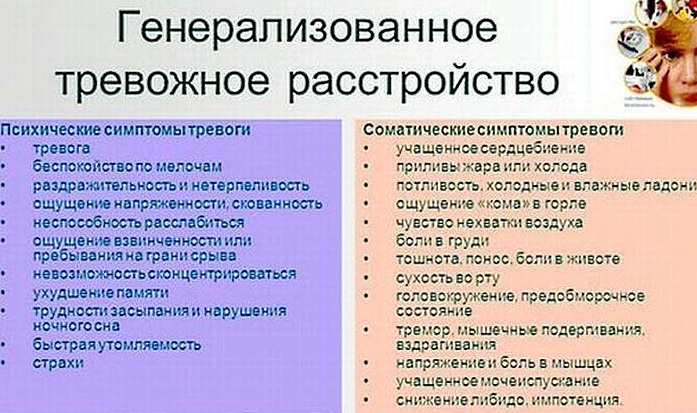
Vegetative symptoms include the following:
- chills;
- disorders of stool and urination;
- discomfort in the solar plexus area;
- tremor;
- excessive sweating.
Phobic
A phobic disorder is associated with a specific phobia of a person when they are afraid to face their fear. The most common phobias are air travel, tunnels, altitude, type of blood. When faced with their phobia, a person experiences severe anxiety, accompanied by a rapid heart rate, shortness of breath and other symptoms.
Also common phobic disorders include agoraphobia (fear of crowds and open spaces, fear of being alone in an unfamiliar place; with agoraphobia, a person is afraid to leave the house) and phobias of a hypochondriacal nature.
Social
In social anxiety disorder, a person avoids any social contact, as they cause him to panic, fear and anxiety. Such people are withdrawn and uncommunicative. They also react very painfully to criticism in their direction.
People with social disorder are afraid to perform on stage or in front of a group of people (even a small one). The thought of this causes them to panic attacks, so they always refuse to go public.
Post-traumatic
PTSD arises against the background of past traumatic situations and factors or imagined fears about the future. Symptoms of this type of disorder are nightmares, constant thinking about negative situations, and conscious avoidance of similar situations.
Panic disorder
Panic disorder or panic attacks are short-term, periodic attacks of intense fear and anxiety arising from a situation or thought. Attacks can last from a few minutes to several hours and are accompanied by a large number of vegetative symptoms.
Obsessive compulsive disorder
Obsessive-compulsive disorder manifests itself in persistent obsessive thoughts that are not it turns out to completely control (obsessions) and the following obsessive movements, "neutralizing" obsession. For example, a person is constantly haunted by the thought that he will soon die, and when thinking about this, he knocks on a tree or spits over his left shoulder.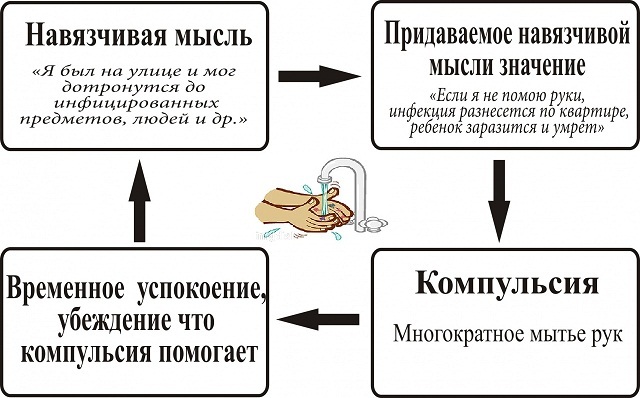
People with OCD are often afraid of contracting an illness (obsessive thought), so they constantly wash their hands or treat them with antiseptics (obsessive movement). They are also constantly worried about whether they closed the door, turned off the iron, fed the pet, and similar situations.
Organic
Organic anxiety disorder is accompanied by the presence of a physical illness. Therefore, patients with this diagnosis often have diseases of the liver, gastrointestinal tract organs, or pathologies of the nervous system (especially the brain).
Also, the following conditions can provoke changes in the human psyche and the development of an anxiety disorder:
- pathology of the thyroid gland;
- deficiency of certain vitamins and minerals;
- pheochromocytoma.
Organic anxiety disorder requires compulsory treatment of the underlying disease.
Symptoms
The main symptom of anxiety disorder is persistent or frequent uncontrollable feelings of anxiety. In different patients, it can be expressed in different ways - for someone, anxiety can interfere with performing daily activities and communicating with people, and for someone it develops in a mild form.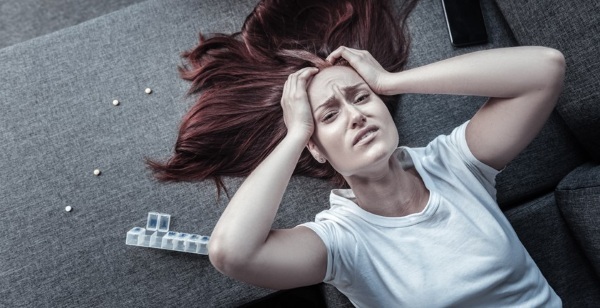
Also, the following symptoms are characteristic of anxiety disorder:
- frequent anxiety;
- mood swings;
- disorders of attention and memory, acuity of reactions;
- weakness and fatigue;
- sleep disorders;
- irritability;
- body pain for no reason.
During acute attacks of fear or panic attacks, the patient may feel a lump in the throat, tremors in the limbs, increased sweating, and changes in pulse and blood pressure. Cramps, nausea and vomiting, dizziness are also possible.
Causes
The reasons for the development of some types of anxiety disorder are not yet fully understood.
However, patients with anxiety disorder often have the following conditions that can be the cause of the anxiety disorder:
- cardiovascular diseases;
- hormonal disorders;
- diseases of the nervous system;
- brain injury;
- congenital pathologies of the central nervous system;
- neurotic conditions (neuroses, asthenia) as a result of prolonged stress;
- sexual dysfunction (decreased libido, erectile dysfunction, premature ejaculation).
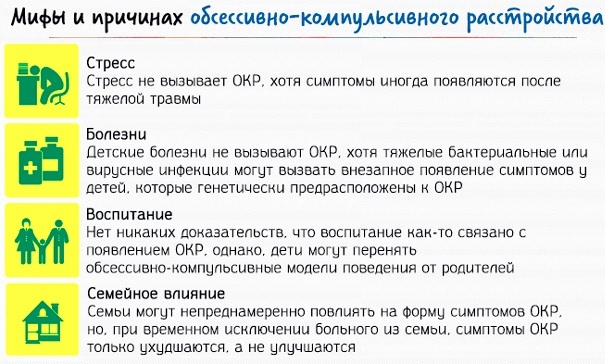
In phobic and post-traumatic anxiety disorder, the cause of the development of the disease is any situation and objects from which a person was so scared that now he experiences anxiety at the thought and meeting with a dangerous one factor.
In some cases, the cause of anxiety disorder is the use of drugs (especially psychotropic drugs) or their abrupt withdrawal, alcoholism or drug addiction. Also, the disease is often diagnosed in mental patients with schizophrenia, various manias and paranoia.
Diagnostics
Anxiety disorder is diagnosed and treated by a psychotherapist or psychiatrist. Specialists such as a psychologist or psychoanalyst cannot diagnose the disorder, but help in its treatment and correction.
Anxiety disorder, the symptoms and treatment of which require mandatory supervision by a specialist, is difficult to define with a large accuracy, since there are no objective biomarkers of the disease (which could be identified using laboratory or instrumental methods).
Diagnosis of pathology consists in a thorough conversation with the patient, during which the doctor asks him about the lifestyle, symptoms, everyday emotions and mood. An important criterion for the diagnosis is the presence of anxiety and anxiety for at least 6 months.
Also, in the course of diagnostics, various surveys and tests are used:
| Spielberger-Hanin scale | A scale by which the level of personal and situational anxiety is determined, and which helps to distinguish between these two states. |
| Markert test | A projective test that determines a person's mood.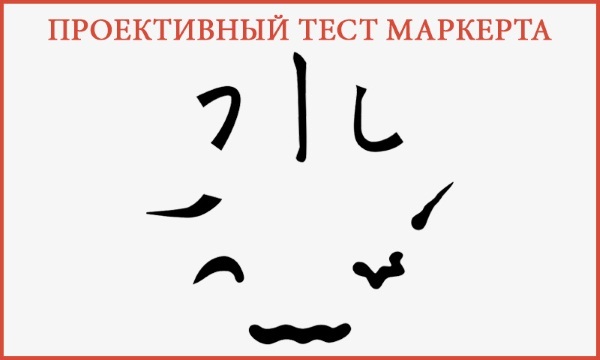
|
| Rorschach spots | A projective test that identifies the characteristics of a person's character. |
When diagnosing, it is necessary to take into account whether the patient is taking any drugs (especially narcotic ones), whether he has alcoholism or drug addiction.
Treatment methods
Treatment for anxiety disorder is complex. It includes individually tailored drug therapy (based on symptoms), lifestyle changes and psychological correction.
Lifestyle change
It is important to change your lifestyle in a healthier way to reduce chronic stress and chronic anxiety, normalize sleep, hormonal balance and the functioning of the nervous system.
This treatment for anxiety disorder includes:
- avoidance (if possible) of emotional and psychological overload and stress;
- physical exercise;
- rational nutrition (it is recommended to remove sugar and all foods with its content from the diet, since sugar has been proven to cause depression and related conditions);
- reduced consumption of caffeine;
- reduction or complete cessation of smoking;
- normalization of sleep-wake modes (you need to go to bed strictly before 23:00).
Drug treatment
Medical treatment of anxiety disorder is individualized. The choice of drugs depends on the type of illness and the specific symptoms. The main drugs in the treatment of anxiety disorder are antidepressants of the group of selective serotonin reuptake inhibitors.
Since a factor in the development of anxiety disorder is a disruption in the work of serotonin mediators, then SSRIs are used, since they lead to an increase in serotonin levels and an increase in mood.
Also, with the disease, the following types of antidepressants can be prescribed: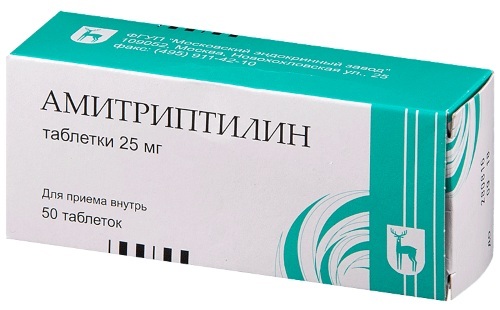
| Antidepressant group | Action | Drug names |
| Tricyclic | The action of tricyclic antidepressants is aimed at enhancing the production of serotonin and norepinephrine by the brain. | Amitriptyline, Clomipramine, Azafen |
| Monoamine oxidase inhibitors | They are used to treat panic conditions and attacks, and have analgesic effects. | "Fenelzine", "Isocarboxazid" |
| Atypical depressants | They have anti-anxiety and anti-depressant effects. | "Brintellix" |
In addition, they are prescribed: sedatives that have a sedative effect and normalize sleep; tranquilizers (anxiolytics) - eliminate anxiety, have a relaxing effect; antipsychotics - improve the functioning of the autonomic nervous system, increase the level of memory and attention.
Folk methods
Traditional methods for anxiety disorder have a supportive effect. Most of the funds are aimed at calming the nervous system and eliminating irritability, normalizing sleep.
Soothing herbal baths
Soothing herbal baths help relieve tension, irritability and anxiety. You need to take them in the evening, before bedtime, as they have a mild hypnotic effect.
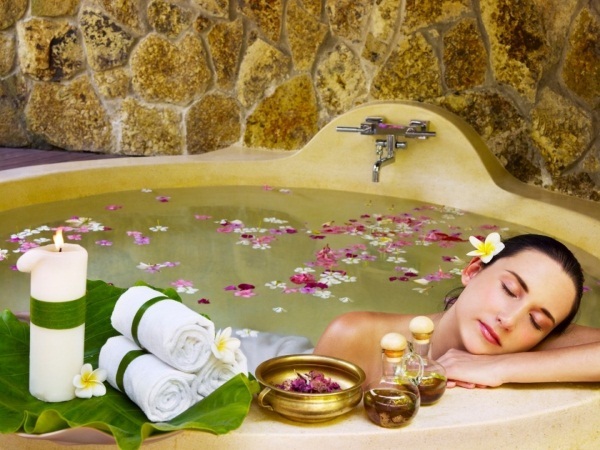
To prepare a bath, you will need 1 tbsp. herbs motherwort, yarrow and valerian root, as well as 1 liter of hot water.
Cooking process:
- The herbs need to be poured with water and insisted for 15 minutes.
- Next, the infusion must be filtered and poured into the collected bath.
- The bath should be taken within 30 minutes, then the liquid should be allowed to dry naturally on the skin.
- Procedures should be performed every other day, the number of procedures is 4-5.
Herbal infusion
For cooking you will need:
- 1 tsp willow-tea leaves;
- ½ hour l. meadowsweet leaves;
- 1 tsp mint leaves;
- ½ tsp nettle leaves;
- 500 ml hot water.
Cooking process: herbs need to be poured with water, insisted for 20-30 minutes, drain. Take 1 glass 2 times a day for 2 weeks. This infusion quickly soothes and helps to eliminate irritability.
St. John's wort decoction
St. John's wort contains the substance hypericin, which helps to eliminate depressive conditions, improve mood and increase the functions of the nervous system.
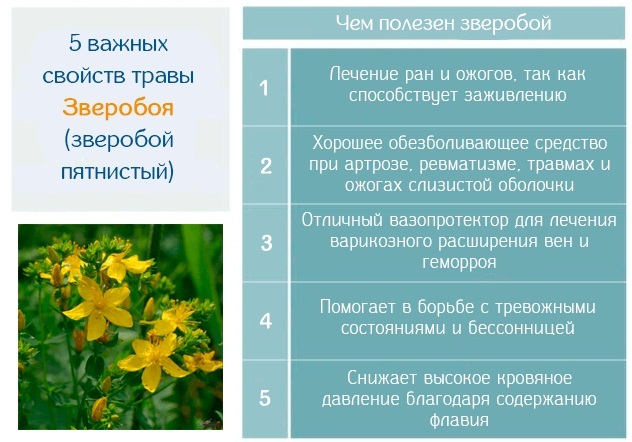
From St. John's wort, you can prepare a medicinal decoction:
- You need to take 1.5 tbsp. chopped and dried herb St. John's wort and pour 250 ml of boiling water.
- The mixture must be placed in a water bath and simmer for 30 minutes.
- Further, the broth must be completely cooled, strain and drink 80-100 ml 3 times a day.
The course of treatment is 2 weeks.
Lemongrass tincture
Schisandra chinensis is another herbal antidepressant that has few side effects, but improves mood, relieves tension and anxiety.
For cooking you will need:
- 150 g of lemongrass creepers;
- 3 tbsp. l. lemongrass berries;
- 1 liter of vodka.
Cooking process:
- Liana needs to be finely chopped.
- Next, in a dark glass jar, you need to combine the liana, berries and pour the raw material with vodka.
- It is necessary to insist the remedy for 1 month, then it must be filtered.
You need to take the tincture according to the following scheme: 1 tbsp each. 2 times a day for 1 month.
Psychocorrection
Anxiety disorder (symptoms and treatment of the disease are related to each other) can be eliminated or corrected without the use of antidepressants with the help of psychotherapy.
To do this, use its various methods:
-
Cognitive Behavioral Therapy - aims to change thoughts that inspire anxiety and anxiety. During therapy, the patient learns to control his thoughts and behavior under conditions of increased stress (which entails the development of an anxiety state), as well as quickly cope with attacks of panic attacks on one's own.
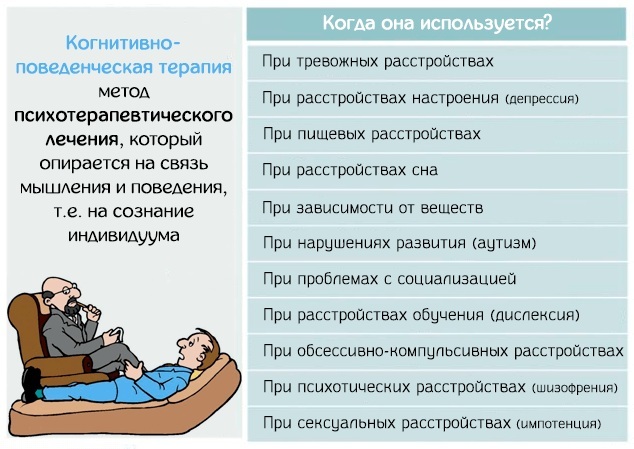
- Hypnotherapy (hypnosis) - helps to identify the psychological causes of anxiety disorder by putting the patient into a hypnotic state and asking him about various situations in childhood, adolescence and adulthood. The result of hypnotherapy is finding traumatic situations and living them quietly, that is, the patient “lets go” of this situation from his consciousness and subconsciousness.
- Autogenic therapy - is aimed at restoring body functions disturbed by stress. The basis of autogenous training includes exercises for muscle relaxation, self-hypnosis and self-education. The result of the procedures is a decrease in emotional and muscle tension, the level of anxiety and the elimination of some symptoms from the autonomic nervous system (normalization of pressure, digestive process, elimination of head pain).
Immersion therapy is also used for treatment, in which the patient is artificially placed in the environment of his experiences and fears. During the procedures, the patient learns to deal with his fears, accepting and overcoming them.
The positive result of psychotherapy is a sustainable change in the behavior of patients, the acquisition of skills self-relaxation in stressful situations, an adequate response to stress, negative memories or thoughts about own future. For a sustainable and effective result, a set of classes is required (from 3 sessions).
Other psychotherapy methods
Also, methods such as art therapy (drawing - has a relaxing effect, relieves stress), fairy-tale therapy (search and living traumatic factors through fairy tales), animal therapy (communication with animals, most often with dolphins or horses - helps to eliminate stress, reduce anxiety and stress).
These methods are often used in conjunction with cognitive-behavioral, hypnotic, or autogenic therapy. Together, they have an even greater positive effect on the patient.
Yoga
Yoga has been shown to help combat stress, nervous tension and anxiety.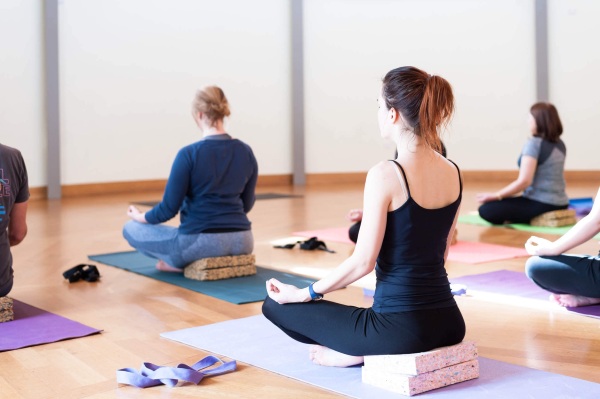 Regular yoga classes (3 times a week) for 30-60 minutes. help you learn how to regulate your condition during stress, effectively cope with situations that require high emotional stress without harming your mental state.
Regular yoga classes (3 times a week) for 30-60 minutes. help you learn how to regulate your condition during stress, effectively cope with situations that require high emotional stress without harming your mental state.
Possible consequences of complications
Anxiety disorder, the symptoms and treatment of which depend on the severity of the disease, in the absence of therapy leads to a deterioration in the patient's life, especially social. Due to the constant feeling of anxiety, a person becomes unable to engage in habitual activities - the main focus of attention is directed to the cause of anxiety.
Also, because of this, the patient experiences pressure surges, palpitations, tremors in the limbs, which additionally interferes with the performance of daily activities. In some cases, there are problems with appetite, followed by eating disorders.
If the anxiety disorder progresses, then the person's social interaction worsens, mania may develop. He becomes constantly worried, cannot normally communicate with people, and avoids activities. In very severe cases, patients begin to use alcohol and drugs.
Anxiety disorder negatively affects a person's personality, depresses his thoughts. Constantly being in a state of anxiety, the patient cannot experience positive emotions, he always expects some kind of bad situation, even if at this time he is in a good mood.
Anxiety disorder requires therapy, as in the absence of it, the disease progresses. In severe cases, pathology can drive a person to insanity, so it is important to identify its symptoms in time and consult a doctor.
Anxiety Disorder Videos
Experience of a neurologist in the treatment of anxiety disorders:



